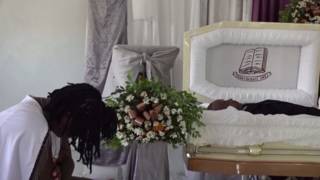
Democracy Now!’s Amy Goodman talks with Haitian President Jean-Bertrand Aristide aboard his flight from the Central African Republic to Jamaica. He landed in Kingston on Monday defying the Bush administration and the U.S.-installed Haitian government.
It has been a historic 48 hours. Haitian President Jean-Bertrand Aristide has defied Washington, returning to the Caribbean. He is now in Jamaica, just 130 miles or so from his native Haiti. This comes two weeks after Aristide said he was taken by force to the Central African Republic in what was a US-orchestrated coup.
Late last night, I returned to New York after a trip that began on Saturday, when I accompanied a delegation of US and Jamaican officials who set off from Miami, Florida on a mission to escort President Aristide and his wife Mildred back to the Caribbean. The delegation was led by California Congressmember Maxine Waters. She was joined by Sharon Hay-Webster, a Jamaican member of parliament, who was representing her Prime Minister PJ Patterson and the Caribbean Community, CARICOM. Also on the delegation was Randall Robinson, the founder of TransAfrica and a close friend of the Aristides, as well as Ira Kurzban, the Haitian president’s lawyer.
This mission took us from Miami to St. Thomas to Dakar, Senegal to Bangui in the Central African Republic and back to Dakar, onto Cape Verde to Dakar, Cape Verde, Barbados and finally Jamaica.
President Aristide’s return to the Caribbean was a trip the Bush administration clearly did not want to happen. In very public statements over the past several days, the most senior US officials said bluntly that they did not want Aristide in the Western Hemisphere.
At this moment, there is a major controversy brewing in the Caribbean. The US-installed Prime Minister of Haiti, Gerard Latortue, has recalled Haiti’s ambassador to Jamaica, in protest of that country’s welcoming of Aristide. Latortue has also announced that he is freezing Haiti’s participation in CARICOM, the 15-member organization of Caribbean nations. CARICOM has called for an independent investigation into the circumstances of Aristide’s removal from Haiti.
After we arrived at Norman Manley International Airport in Kingston, Jamaica yesterday afternoon, the Aristides were quickly escorted to a helicopter, which transported them to an undisclosed location on the island nation. President Aristide did not hold a press conference and at this moment it is unclear when he will be speaking to reporters again.
As we crossed the Atlantic on our way to Kingston, Jamaica, I had a chance to conduct an extensive interview with President Aristide on-board the Gulfstream jet. I asked him for his thoughts on returning to the Caribbean.
PRESIDENT ARISTIDE: CARICOM, on behalf of the people of the region, expressed solidarity with the Haitian people, when the coup, which I call a kidnapping, happened last February 28th, 29th. This opportunity gives me a good chance say “Thank you” to the chairman of CARICOM, Prime Minister Patterson, to the heads, to all our brothers and sisters of the Caribbean family.
AMY GOODMAN: What do you think this means to the people of Haiti, your return to the Caribbean?
PRESIDENT ARISTIDE: Obviously they know how connected we are because they’re suffering. It is my suffering. When they feel I will be closer, I’m convinced they’ll feel better. Although they know being far doesn’t mean a way to not be connected to them.











Media Options